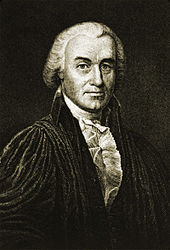The Ellsworth Court refers to the Supreme Court of the United States from 1796 to 1800, when Oliver Ellsworth served as the third Chief Justice of the United States. Ellsworth took office after the Senate refused to confirm the nomination of Chief Justice John Rutledge, who briefly served as a Chief Justice as a recess appointment. Ellsworth served as Chief Justice until his resignation, at which point John Marshall took office. With some exceptions, the Ellsworth Court was the last Supreme Court to use seriatim opinions.[1]
| Ellsworth Court | |
|---|---|
 | |
| March 8, 1796 – December 15, 1800 (4 years, 282 days) | |
| Seat | Old City Hall Philadelphia, Pennsylvania |
| No. of positions | 6 |
| Ellsworth Court decisions | |
 | |
Membership
editThe Ellsworth Court began in 1796 when the Senate confirmed President George Washington's appointment of Ellsworth. Washington had previously nominated both Rutledge and Associate Justice William Cushing to the seat, but Rutledge's nomination was denied by the Senate and Cushing refused the nomination on the basis of his health.[2] The Ellsworth Court began with Ellsworth and four Associate Justices from the Jay Court: William Cushing, James Wilson, James Iredell, and William Paterson. Associate Justice Samuel Chase took office shortly after Ellsworth's tenure began, filling the vacancy caused by the resignation of John Blair, Jr. during the Rutledge Court. Wilson died in 1798, and President John Adams appointed Bushrod Washington to take his seat. Alfred Moore joined the court in 1800 after the death of Iredell.
Timeline
edit
Other branches
editPresidents during this court included George Washington and John Adams. Congresses during this court included 4th through the 6th United States Congresses.
Rulings of the Court
editThe Ellsworth Court issued some notable rulings:
- Hollingsworth v. Virginia (1798): In a per curiam opinion, the court ruled that the president plays no part in amending the Constitution.
- Calder v. Bull (1798): In an opinion written by Justice Chase, the court held that the Constitutional prohibition on ex post facto laws applies only to criminal acts, and that the Supreme Court of United States has no authority to determine whether state laws violate state constitutions.
References
editFurther reading
edit- Abraham, Henry Julian (2008). Justices, Presidents, and Senators: A History of the U.S. Supreme Court Appointments from Washington to Bush II. Rowman & Littlefield. ISBN 9780742558953.
- Bird, Wendell (2016). Press and Speech Under Assault: The Early Supreme Court Justices, the Sedition Act of 1798, and the Campaign against Dissent. Oxford University Press. ISBN 9780190461645.
- Casto, William R. (2012). The Supreme Court in the Early Republic: The Chief Justiceships of John Jay and Oliver Ellsworth. University of South Carolina Press. ISBN 9781611171693.
- Cushman, Clare (2001). The Supreme Court Justices: Illustrated Biographies, 1789–1995 (2nd ed.). (Supreme Court Historical Society, Congressional Quarterly Books). ISBN 1-56802-126-7.
- Friedman, Leon; Israel, Fred L., eds. (1995). The Justices of the United States Supreme Court: Their Lives and Major Opinions. Chelsea House Publishers. ISBN 0-7910-1377-4.
- Gerber, Scott Douglas, ed. (1998). Seriatim: The Supreme Court Before John Marshall. NYU Press. ISBN 9780814732519.
- Hall, Kermit L.; Ely, James W. Jr.; Grossman, Joel B., eds. (2005). The Oxford Companion to the Supreme Court of the United States (2nd ed.). Oxford University Press. ISBN 9780195176612.
- Hall, Kermit L.; Ely, James W. Jr., eds. (2009). The Oxford Guide to United States Supreme Court Decisions (2nd ed.). Oxford University Press. ISBN 978-0195379396.
- Hall, Timothy L. (2001). Supreme Court Justices: A Biographical Dictionary. Infobase Publishing. ISBN 9781438108179.
- Harrington, Matthew P. (2008). Jay and Ellsworth, the First Courts: Justices, Rulings and Legacy. ABC-CLIO. ISBN 9781576078419.
- Hoffer, Peter Charles; Hoffer, WilliamJames Hull; Hull, N. E. H. (2018). The Supreme Court: An Essential History (2nd ed.). University Press of Kansas. ISBN 978-0-7006-2681-6.
- Irons, Peter (2006). A People's History of the Supreme Court: The Men and Women Whose Cases and Decisions Have Shaped Our Constitution (Revised ed.). Penguin. ISBN 9781101503133.
- Martin, Fenton S.; Goehlert, Robert U. (1990). The U.S. Supreme Court: A Bibliography. Congressional Quarterly Books. ISBN 0-87187-554-3.
- Tomlins, Christopher, ed. (2005). The United States Supreme Court: The Pursuit of Justice. Houghton Mifflin Harcourt. ISBN 978-0618329694.
- Toth, Michael C. (2011). Founding Federalist: The Life of Oliver Ellsworth. ISI Books. ISBN 9781935191162.
- Urofsky, Melvin I. (1994). The Supreme Court Justices: A Biographical Dictionary. Garland Publishing. ISBN 0-8153-1176-1.
- Wood, Gordon S. (2009). Empire of Liberty: A History of the Early Republic, 1789-1815. Oxford History of the United States. Oxford University Press. ISBN 978-0-19-503914-6.